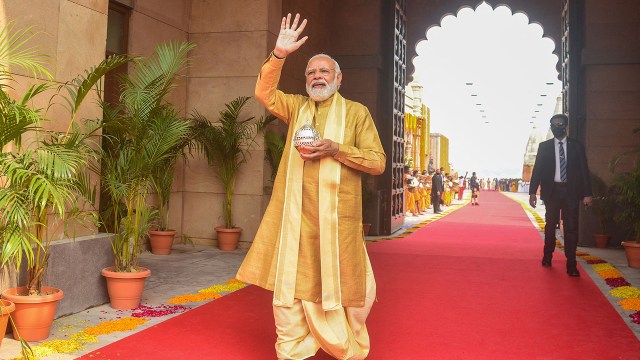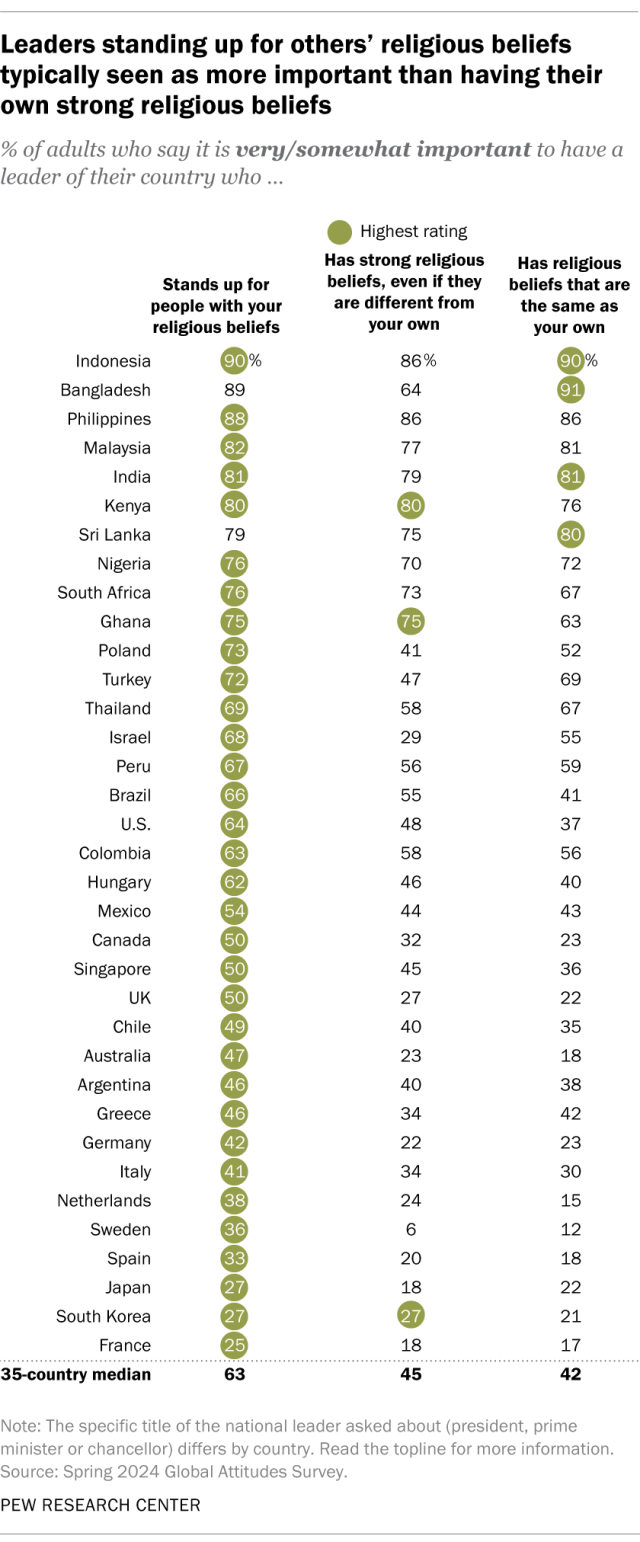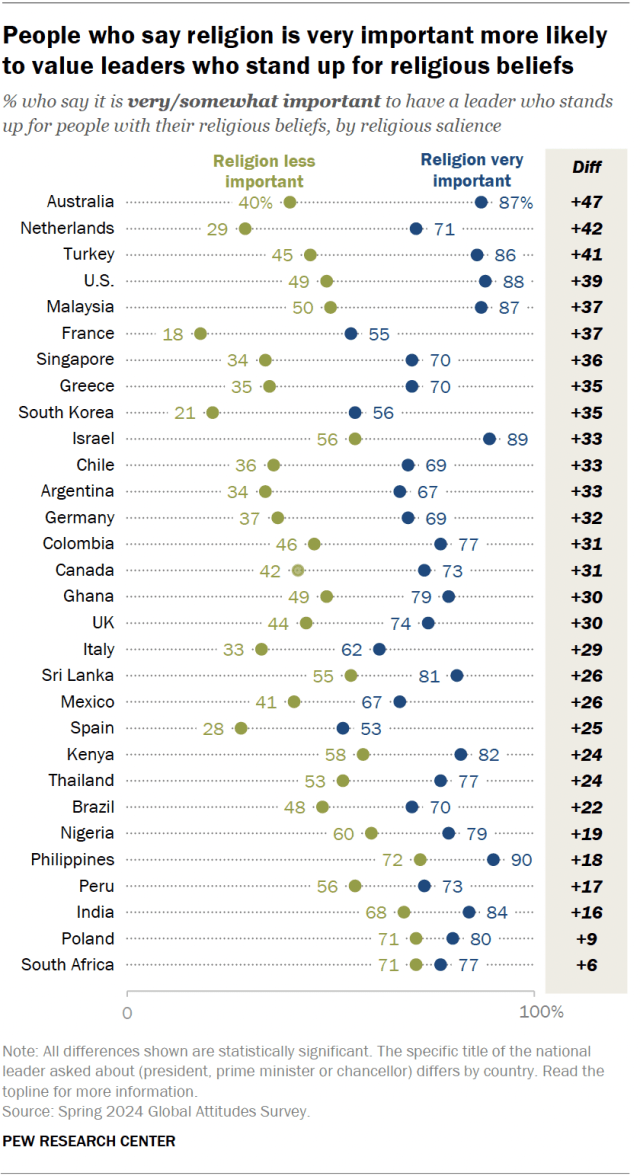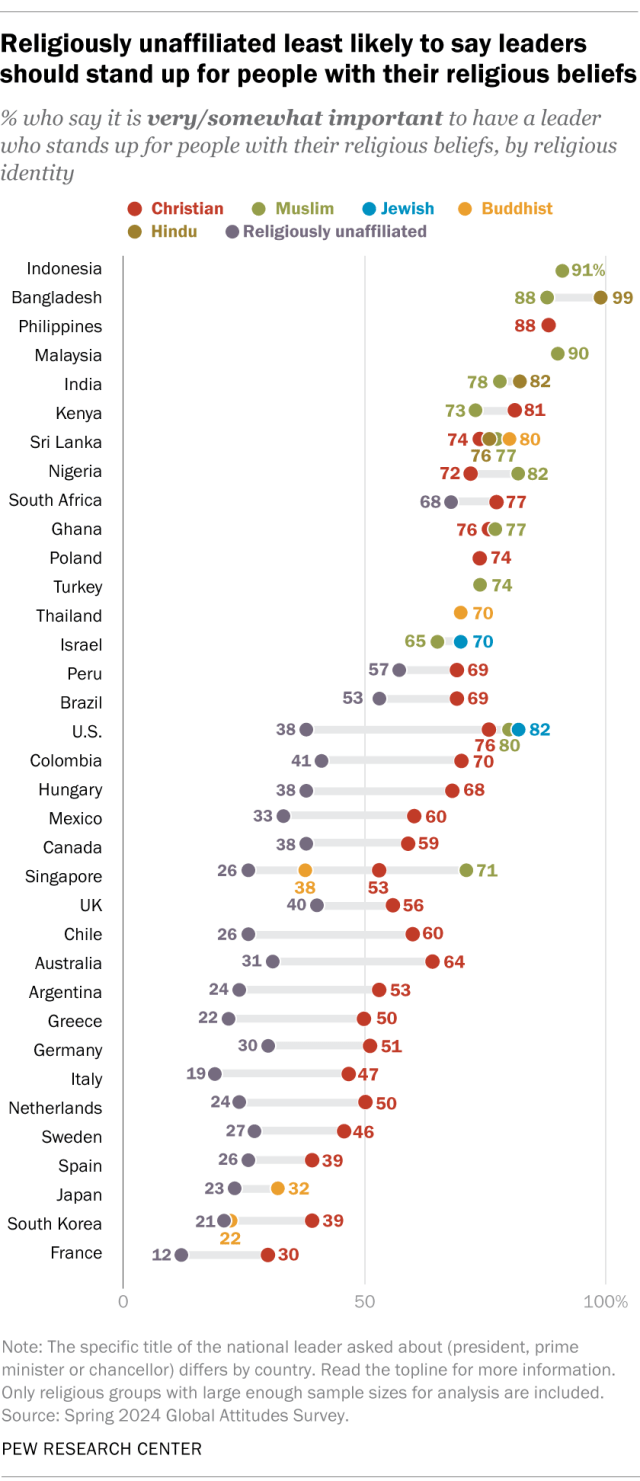
When asked about the leader of their country, people around the world are generally much more likely to say it is important to have someone who stands up for people with their religious beliefs than to say the leader needs to have strong religious beliefs of their own or to have the same beliefs as they do.
This Pew Research Center analysis explores public attitudes about the religious qualities of national leaders in 35 countries in North America, Europe, the Asia-Pacific region, the Middle East-North Africa region, sub-Saharan Africa and Latin America.
This analysis draws on nationally representative surveys of 40,494 adults conducted in 34 countries from Jan. 5 to May 22, 2024. All surveys were conducted over the phone in Canada, France, Germany, Greece, Italy, Japan, Malaysia, the Netherlands, Singapore, South Korea, Spain, Sweden and the United Kingdom. Surveys were conducted face-to-face in Argentina, Bangladesh, Brazil, Chile, Colombia, Ghana, Hungary, India, Indonesia, Israel, Kenya, Mexico, Nigeria, Peru, the Philippines, Poland, South Africa, Sri Lanka, Thailand and Turkey. In Australia, we used a mixed-mode probability-based online panel.
In the United States, we surveyed 12,693 respondents from Feb. 13 to 25, 2024. Most of the respondents (10,642) are members of Pew Research Center’s American Trends Panel (ATP), an online survey panel recruited through national random sampling of residential addresses, which gives nearly all U.S. adults a chance of selection.
The remaining U.S. respondents (2,051) are members of three other panels: the Ipsos KnowledgePanel, the NORC Amerispeak Panel and the SSRS Opinion Panel. All three are national survey panels recruited through random sampling (not “opt-in” polls). We used these additional panels to ensure that the survey would have enough Jewish and Muslim respondents to be able to report on their views.
The U.S. data is weighted to be representative of the U.S. adult population by gender, race, ethnicity, partisan affiliation, education, religious affiliation and other categories.
For more about the U.S. data, refer to the ATP’s methodology and the methodology for our previous report that looked at these questions only in the U.S.
Here are the questions and responses for all 35 countries surveyed, as well as the survey methodology for data collected outside the U.S.
To compare educational groups across countries, we standardize education levels based on the UN’s International Standard Classification of Education (ISCED).
In each country surveyed, only religious groups with large enough sample sizes for analysis are included.
This analysis was produced by Pew Research Center as part of the Pew-Templeton Global Religious Futures project, which analyzes religious change and its impact on societies around the world. Funding for the Global Religious Futures project comes from The Pew Charitable Trusts and the John Templeton Foundation (grant 63095). This publication does not necessarily reflect the views of the John Templeton Foundation.

In the United States, for instance, 64% of adults say it is important to have a president who stands up for people who share the respondent’s religious beliefs. Fewer (48%) say it’s important that a president has their own strong religious beliefs, even if the beliefs differ from those of the respondent. And even fewer Americans (37%) say it is important for a president to have religious beliefs that are the same as the respondent’s.
In countries where religion is perceived as very important, people are generally more likely to value each of these qualities in a leader. For example, 94% of adults in Indonesia say religion is very important in their lives, and 86% there say it’s important for their president to have strong religious beliefs. This is among the highest levels found in the 35 places surveyed.
These findings are from a 35-country Pew Research Center survey conducted from January to May 2024 among more than 53,000 respondents.
Leaders who stand up for people with your religious beliefs
Adults in Indonesia, Bangladesh and the Philippines are the most likely to say it is important to have a leader who stands up for people with their religious beliefs: Roughly nine-in-ten in each country hold this view. Around half or more in 22 additional countries say the same.
However, in several European and East Asian countries, adults are less likely to say it’s important for a national leader to stand up for people with their religious beliefs. France, Japan and South Korea stand out as some of the places where the smallest shares say this is important. In each country, around a quarter of adults say this.
Leaders who have strong religious beliefs, even if they are different from your own
Indonesia and the Philippines again top the list when considering the share of adults who say it’s important that their leader has strong religious beliefs, even if they are different from their own (86% each say this). In all four African countries we surveyed – Ghana, Kenya, Nigeria and South Africa – 70% or more say this, too.
Swedish adults are the least likely to say it is important to have a prime minister who has strong religious beliefs. Just 6% of Swedes say this.
Leaders who have religious beliefs that are the same as your own
About nine-in-ten Indonesian and Bangladeshi adults say it’s important for their leader to have the same religious beliefs as they do. Many people in neighboring South and Southeast Asian countries also feel this way, including 81% of adults in India.
This view is much less common in some countries. In Singapore, a far smaller share (36%) say it is important for a prime minister to share their religious beliefs. And Sweden again has the smallest share of adults who say this is important (12%).
Opinions on these questions among the highly religious

People who say religion is very important in their lives are far more likely than other adults to say it’s important for their country’s leader to stand up for people with their religious beliefs.
For example, 86% of Turkish adults for whom religion is very important say it is important that the president stands up for people with their religious beliefs, compared with 45% among Turks for whom religion is less important.
Similar patterns are evident when it comes to both of the other measures asked about in this survey.
Looking again at Turkey, 55% of adults who consider religion very important say it is important for the country’s president to have strong religious beliefs, even if these beliefs are different from their own. Among less religious Turkish adults, 33% think this is important.
How do people with different religious identities feel?

Differences on these questions also emerge by respondents’ religion.
Among Hindus, majorities say that all three measures of leaders’ religion-related qualities are important. For example, nearly all Hindus in Bangladesh – 99% – say it is important for their prime minister to stand up for people with their religious beliefs. (The survey took place before Bangladesh’s prime minister resigned.)
Likewise, most Buddhists in both of the Buddhist-majority countries we surveyed – Sri Lanka and Thailand – say all three religious aspects we asked about are important in their leaders. But for Buddhists elsewhere, far smaller shares voice these opinions. For example, while 70% of Thai Buddhists feel it is important for their prime minister to stand up for people with their religious beliefs, only 32% of Japanese Buddhists say the same.
In general, most Muslims also say the various religious measures we asked about are important when it comes to their leaders. But Muslims in Israel are a notable exception. Only 30% of Israeli Muslims say it’s important for the Israeli prime minister to have strong religious beliefs, even if they differ from respondents’ own beliefs.
Attitudes among Jews are mixed in Israel and the U.S. (the only two places surveyed with large enough sample sizes of Jews to analyze). Most Jewish adults in both countries say it is important for their prime minister or president, respectively, to stand up for people with their religious beliefs. But only about three-in-ten Jewish adults in either place say it is important for the leader to have strong religious beliefs.
And in the U.S., where only about 2% of the population is Jewish, just 13% of Jewish adults say it is important for the president to have religious beliefs that are the same as theirs. In Israel, where a large majority of the population is Jewish, 59% of Jews see this as important.
The opinions of Christians vary widely by country for all three measures. For example, the share of Christians who say it’s important for their country’s leader to stand up for people with their religious beliefs ranges from 88% in the Philippines to 30% in France.
The religiously unaffiliated are consistently the least likely group to say each of these measures is important. For instance, three-in-ten unaffiliated German adults say it is important for their chancellor to stand up for people with their religious beliefs. Roughly half of German Christians say the same.
Differences by education, ideology and age
Adults with more education tend to be less likely than others to perceive the religion-related qualities of their country’s leader as important. In Greece, for instance, 38% of adults with at least a postsecondary education say it is important to have a prime minister who stands up for people with their religious beliefs. But among Greeks with less education, 49% say this.
Views also vary by ideology. In many countries, those on the ideological right are more likely than those on the left or in the center to say their leader’s religious beliefs are important. For example, in Turkey, those on the right are twice as likely as those on the left to say it is important to have a leader who shares their religious beliefs (92% vs. 46%).
Across many countries surveyed, younger and older adults largely agree on the importance of the three measures asked about when it comes to their country’s leader. However, in Latin America, adults under 40 are consistently less likely than those ages 40 and older to say each is important. For example, in Chile, 42% of adults under 40 say it is important to have a president who stands up for people with their religious beliefs. That share rises to 54% among older Chileans.
Note: Here are the questions and responses for all 35 countries surveyed, as well as the survey methodology for data collected outside the U.S.


